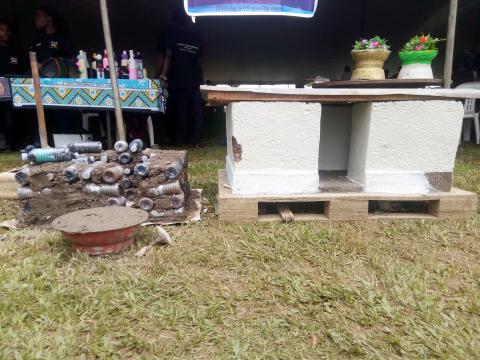Mak Students Build Dummy Houses Using Plastic Bottles
Submitted by wakaija on

In a bid to protect the environment, a group of students at Makerere University have advanced the idea of building houses using plastic bottles.
Plastic bottles are regarded as a waste material, but these students see them as raw material in the construction of buildings.
During the Entrepreneurship Expo 2019 in Freedom Square, organised by the College Business and Management Sciences (CoBAMS), the students exhibited their creativity through the display of various products and items.
Richard Okello, a second year student in the Bachelor of Commerce programme, advanced the idea of utilizing the available resources as a way of conserving the environment through using used plastic bottles in the construction of houses.
In an interview during the expo on this week, Okello said that he collects used bottles which are dispersed around the environment. He fills them up with polythene papers and others with soil, after which he mixes sand with cement and water and starts building. “People in rural areas face a challenge of limited raw materials, but this time used plastic bottles are in place to replace bricks which are quite expensive and this advancement is accessible to everyone,” Okello said.
He added that these plastic bottles are extremely strong where by the building can last for about 100 years and above when it's renovated.
Dr Cathy Mbadde, a lecturer at CoBAMS said: “This year's exhibition the students turned up in big numbers and showcased a variety of products.”
She noted that the expo gives students who are pursuing business courses to practice their business ideas that they may decide to adopt after education. Ian Vanoni, a second year student perusing a bachelor of arts with economics said: “Now I am able to use plastic bottles to construct a building at my locality at any time since the wall is strong and the plastic bottles are accessible.” He added that he is going to share the skills and knowledge with people in his community in order to conserve and protect the environment.
- 553 reads
